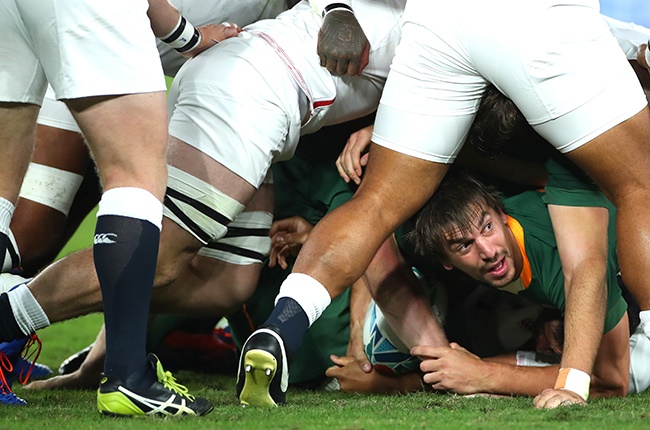


Springboks v England (Cameron Spencer/Getty Images)
Cameron Spencer/Getty Images
- England’s Rugby Football Union has urged government to relax its rules on social distancing, calculating such a move be worth £12 million (R256 million) if crowds are allowed.
- Britain is currently insisting on a two-metre gap in public as one of a set of measures to stop the spread of Covid-19.
- The RFU will not compromise safety in favour of larger crowds or go against regulations but officials want “clarity on whether the two-metre rule is absolutely essential”.
The Rugby Football Union (RFU) has urged the British government to relax its rules on social distancing, calculating such a move be worth £12 million (R256 million) to England’s governing body if crowds are allowed back into Twickenham for the November internationals.
Register your interest for the British & Irish Lions tickets in South Africa 2021
Britain is currently insisting on a two-metre gap in public as one of a set of measures to stop the spread of the coronavirus.
But RFU chief executive Bill Sweeney said opting for a one-metre space instead would have a dramatic effect on the numbers allowed into Twickenham, a ground with an 80 000 capacity.
“If you are using two metres, you are talking about a four-metre distanced safe space,” he said. “With one, it is one metre all round which has the effect of increasing capacity fourfold.
“If you use two metres in an 80 000-seater stadium and factor in traffic flow, such as someone wanting to use the toilet without going past someone and touching them, it reduces your capacity to between 9 000 and 9 500.
“I was surprised, not thinking it would be that low. With one metre, which is the World Health Organisation’s guidance, you get close to 40 000, and we would like it to come down to that by the autumn.”
Sweeney stressed the RFU would not compromise safety in favour of larger crowds or go against UK government regulations but officials wanted “clarity on whether the two-metre rule is absolutely essential or is one metre possible”.
England still hope to play their scheduled November matches at home to New Zealand, Argentina, Tonga and Australia.
Asked what the financial difference would be in terms of a two-metre as opposed to a one-metre gap between seats, Sweeney replied: “It depends on who you have coming and ticket pricing.
“It is probably worth in the region of £3 million a game and I believe we would be able to open catering facilities, as long as they were out of doors.”
Sweeney has insisted all options are on the table, be it moving the Six Nations or pushing back the dates of next year’s British and Irish Lions tour of South Africa as talks continue over how best to reshape the professional game worldwide.
He added the uncertainty facing the sport lay behind the RFU’s decision to vote in favour of re-electing former England captain Bill Beaumont as chairman of World Rugby rather than back rival candidate Agustin Pichot of Argentina, even though their manifestos were “virtually identical”.
“The way it was pitched was that Bill Beaumont represented the establishment and the traditional, fixed way of doing things and Gus Pichot represented the fresher, younger more innovative approach,” said Sweeney.
“We felt going into this period of change, and there will be change, having a degree of stability would help change; sometimes you do not want too much change to manage change.”

